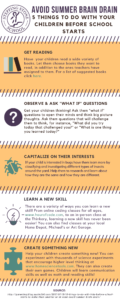5 Things to Do with Your Children Before School Starts
My soon-to-be kindergartener asks regularly, “Do I get to go to Kindergarten today?”
We’ve marked the calendar, purchased school supplies, met with other up-and-coming Kindergarteners, but, the day is not coming soon enough for my excited five-year-old.
Whether your child is entering elementary school for the first time or returning for another year, here are five things you can do to help your child prepare mentally for the challenging rigors of the upcoming school year:
- Get Reading. Beginning in infancy, reading together builds language acquisition and literacy skills. A recent study demonstrated significant literacy gains in children ages 4-5 who were read to three to five times a week putting them approximately 6 months ahead of their peers in reading. Those who were read to daily tested a full year ahead of those who were read to less frequently (Huffington post, 2013). The National Association for the Education of Young Children (NAEYC) upholds, “Reading aloud is important from infancy through the high school years. Families and teachers can create and continue a tradition, introduce and reinforce the pleasures of reading, and, as children get older, set the stage for meaningful conversations about numerous topics.” (Koralek, 2005). Well-read children enjoy a rich vocabulary, improved communication skills, increased knowledge of a wide range of topics, improved attention spans, and are more self-confident than their lesser-read peers.
- Observe and Ask “What if” questions. Your life experiences have increased your knowledge base and enabled you to think critically, problem solve, and improve on a plan of action. When children are creating, building, and playing they are constantly planning, building, and re-designing. When you step back and observe, you may be amazed at the complex problem solving strategies your child is already employing. By asking simple “What if” questions like, “What if you put that piece there?” or “What if you encounter…?” you are enabling your child to creatively develop other contingencies she may not have thought about initially. You are effectively using your life experiences to increase her knowledge base.
- Capitalize on their Interests. Is your child interested in animals? How things work? Outer space? Head to the library to conduct some research together. Take a trip to explore and learn about whatever topic your child is most interested in. Go online to find resources so your child can learn more about a given topic. Children are motivated learners when they are investigating something of their own choosing. Invite them to communicate their learning by creating a picture book to show younger siblings or have them put together a short presentation for the family.
- Learn a New Skill. Given the opportunity, what would you like to learn? If you had time, oh let’s say a summer break, what new thing would you try? Summer, whatever is left of it, is the perfect opportunity to learn something new: coding, cooking, acting, or a new sport. This is your child’s opportunity to begin a new school saying, “Look at what I have learned.” Many hobby and hardware stores offer free classes for children and adults on a regular basis.
- Create Something New. Is it a bird? A plane? No, it’s “something new!” The sky is the limit! Children are SO creative. Encourage your child to experiment, investigate, problem solve. Children do not have to wait until the spring science fair to begin working through the scientific method. Encourage your child to ask questions, look for answers, experiment, and discover solutions. Have her create hypotheses, test theories, and draw conclusions.
Entering a new school year is an opportunity to approach learning with fresh excitement and vigor. Children want to use their talents, follow their interests, and share their learning with you. Use these final days of summer to create memories which will last a lifetime. Read, Learn, and Create!
Things to do with your children before school starts-2 
Resources: